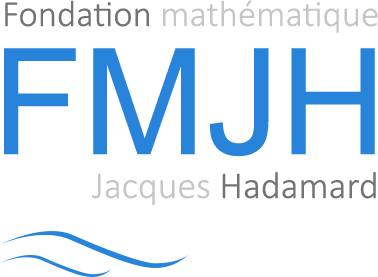Parallel Solution Methods for Systems Arising from PDEs
Méthodes parallèles pour la résolution de systèmes issus d’équations aux dérivées partielles
16 – 20 September 2019
|
Scientific Committee
Comité scientifique Axel Klawonn (University of Cologne) |
Organizing Committee
Comité d’organisation Victorita Dolean (Université Nice Sophia-Antipolis & University of Strathclyde) |
|
Partial differential equations (PDEs) arise in the mathematical modelling of many physical phenomena as well as science and engineering problems. The discretisation of PDEs leads to potentially very large systems that must be solved in parallel. In practice, the accuracy to which a PDE can be solved is very often limited either by the computa-tional resources (hardware), or by the computational time available. This is the bottleneck addressed by the present conference. With the advent of massively parallel machines, new paradigms have arisen. New numerical methods for these paradigms are being devised, and old methods are being reconsidered.
The objective is to bring together international specialists at various stages of their careers who are active contributors to the conception, analysis and implementation of parallel solvers for systems arising from PDEs. Special care has been taken to include specialists from the numerical analysis, numerical linear algebra, computational mechanics and high performance computing communities to the list of invited speakers and participants. The conference should provide an ideal setting for assessing the current state of the art as well as foster new interactions and collaborations on some of the new and promising techniques in the field: asynchronous methods, special preconditioning strategies, adaptive coarse spaces, communication-avoiding linear algebra techniques, and low rank approximations by hierarchical matrices. |
La modélisation de nombreux phénomènes physiques et systèmes d’ingénierie prend la forme d’équations aux dérivées partielles (EDPs). La discrétisation de ces EDPs donne naissance à des systèmes potentiellement très larges qu’il faut résoudre sur des architectures de calcul parallèle. En pratique, la précision avec laquelle on peut résoudre numériquement un système d’EDPs est très souvent limitée par les moyens de calcul (au sens des machines) ou par le temps de calcul disponible. C’est ce problème auquel la conférence s’intéresse. La généralisation des architectures de calcul parallèles a, en effet, fait émerger de nouveaux paradigmes avec la conséquence que de nouvelles méthodes numériques se développent, remettant en cause les méthodes plus anciennes.
L’objectif de la conférence est de rassembler des spécialistes internationaux à différents stades de leurs carrières qui contribuent activement à la conception, l’analyse et l’implémentation de solveurs parallèles pour des systèmes issus d’EDPs. La liste de conférencier.e.s et de participant.e.s invité.e.s mêle des membres des communautés d’analyse numérique, d’algèbre linéaire numérique, de mécanique computationnelle et de calcul haute performance. Cette conférence devrait être le cadre idéal pour faire le point sur l’état de l’art et faire fructifier de nouvelles interactions et collaborations sur des techniques prometteuses dans le domaine: méthodes asynchrones, préconditioneurs, espace grossiers adaptatifs, solveurs économes en communication, approximation de rang réduit avec des matrices hiérarchiques. |
Emmanuel Agullo (INRIA Bordeaux – Sud-Ouest) On the design and interface of parallel scalable sparse hybrid linear solvers
Marcella Bonazzoli (INRIA Saclay / Ecole Polytechnique) Multi-Trace FEM-BEM formulation for acoustic scattering by composite objects
Erik Boman (Sandia National Laboratories) Hierarchical low-rank preconditioners and solvers for linear systems from PDEs
Niall Bootland (University of Strathclyde) A GenEO coarse space for solving the heterogeneous Helmholtz equation with domain decomposition methods
Erin Carson (Charles University, Prague) Iterative Refinement in Three Precisions
Edmond Chow (Georgia Institute of Technology) Asynchronous Iterative Solvers
Victorita Dolean (Université Nice Sophia-Antipolis & University of Strathclyde) Numerical assessment of two-level domain decomposition preconditioners for incompressible Stokes and elasticity equations
Iain Duff (Rutherford Appleton Laboratory) Parallel solution of large sparse systems by direct and hybrid methods
Jocelyne Erhel (INRIA Rennes Bretagne Atlantique) Numerical tools for simulating large scale reactive transport systems
Andreas Frommer (Wuppertal University) Computing interior eigenvalues of the symmetrized Dirac operator in lattice QCD
Martin J. Gander (Université de Genève) Multigrid and Domain Decomposition: Similarities and Differences
Christian Glusa (Sandia National Laboratories) Asynchronous Domain Decomposition Solvers
Shihua Gong (University of Bath) Parallel preconditioning strategies for the high frequency heterogeneous Helmholtz equation with cavities
Ivan Graham (University of Bath) Parallel preconditioning strategies for the high frequency heterogeneous Helmholtz equation with cavities
Laura Grigori (INRIA Paris) Challenges in achieving scalable and robust linear solvers
Laurence Halpern (Université Paris 13) Optimized Schwarz methods for complex elliptic problems
Frédéric Hecht (Sorbonne Université) Fractional decomposition of matrices and easy parallel computing
Bo Kågström (Umeå University) StarNEig – A Task-based Library for Solving Nonsymmetric Eigenvalue Problems
Axel Klawonn (University of Cologne) Machine Learning in adaptive domain decomposition methods – predicting the geometric location of constraints
David Keyes (King Abdullah University of Science and Technology) Hierarchical Algorithms on Hierarchical Architectures
Sabrina Le Borne (Hamburg University of Technology) Preconditioners for RBF-FD discretized fluid flow problems
Pierre Marchand (INRIA team ALPINES) Robust coarse spaces for the boundary element method
Volker Mehrmann (TU Berlin) Numerical solution of extreme eigenvalue problems in inexact arithmetic
Axel Modave (CNRS ENSTA ParisTech) An efficient domain decomposition method with cross-point treatment for Helmholtz problems
Emile Parolin (INRIA Saclay) DDM with non local transmission conditions for wave propagation problems
Lothar Reichel (Kent State University) A simple iterative method for discrete Helmholtz decomposition
Daniel Rixen (TUM Munich) A promenade over FETI solvers applied to structural dynamic problems
François Xavier Roux (ONERA) A new implementation of S-FETI with less memory requirement
Valeria Simoncini (University of Bologna) Computational methods for large-scale matrix equations and application to PDEs
Pierre-Henri Tournier (CNRS Sorbonne Université) Domain decomposition methods in FreeFEM with ffddm
Andy Wathen (Oxford University) Parallel preconditioning for time-dependent PDEs and PDE control







